2024年中考英语人教版一轮复习专题讲义 学案 第1讲 动词和动词短语
文档属性
| 名称 | 2024年中考英语人教版一轮复习专题讲义 学案 第1讲 动词和动词短语 | 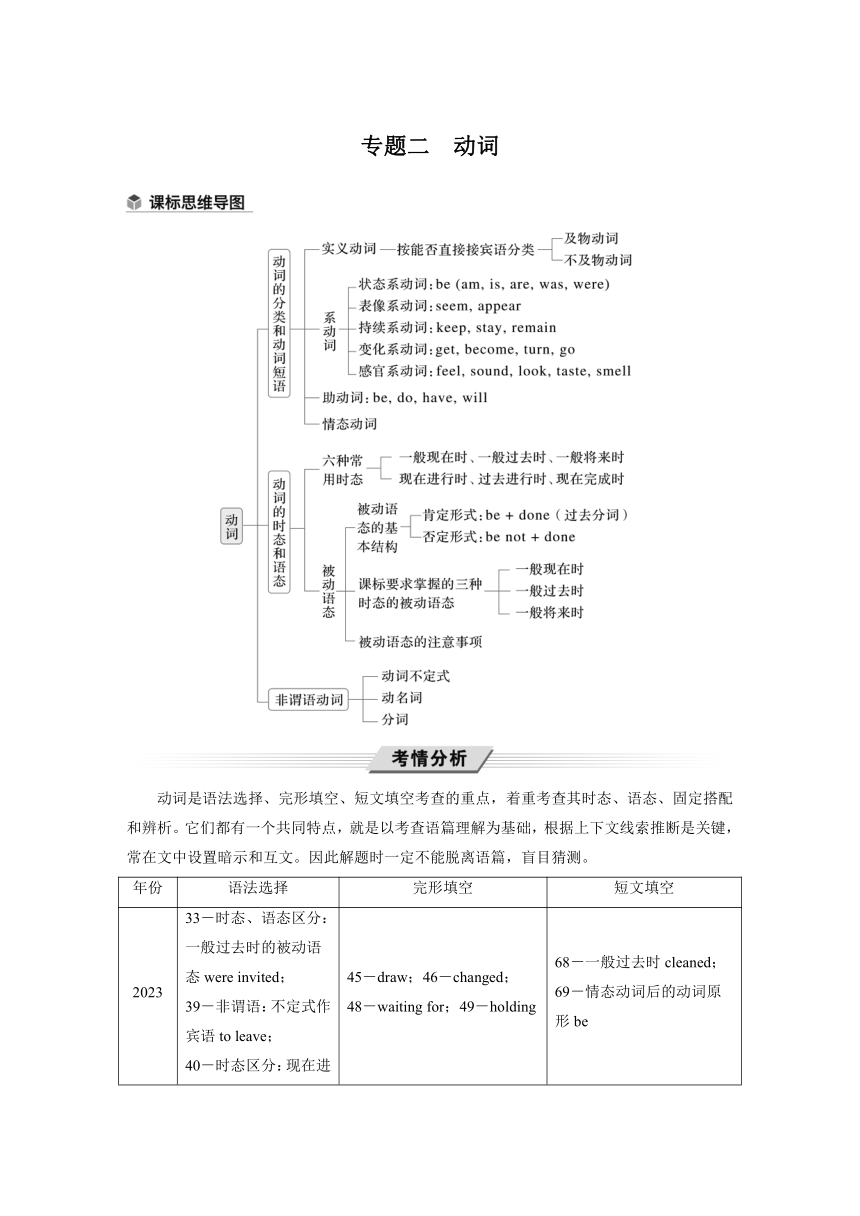 | |
| 格式 | docx | ||
| 文件大小 | 636.6KB | ||
| 资源类型 | 教案 | ||
| 版本资源 | 通用版 | ||
| 科目 | 英语 | ||
| 更新时间 | 2024-03-11 21:30:32 | ||
图片预览

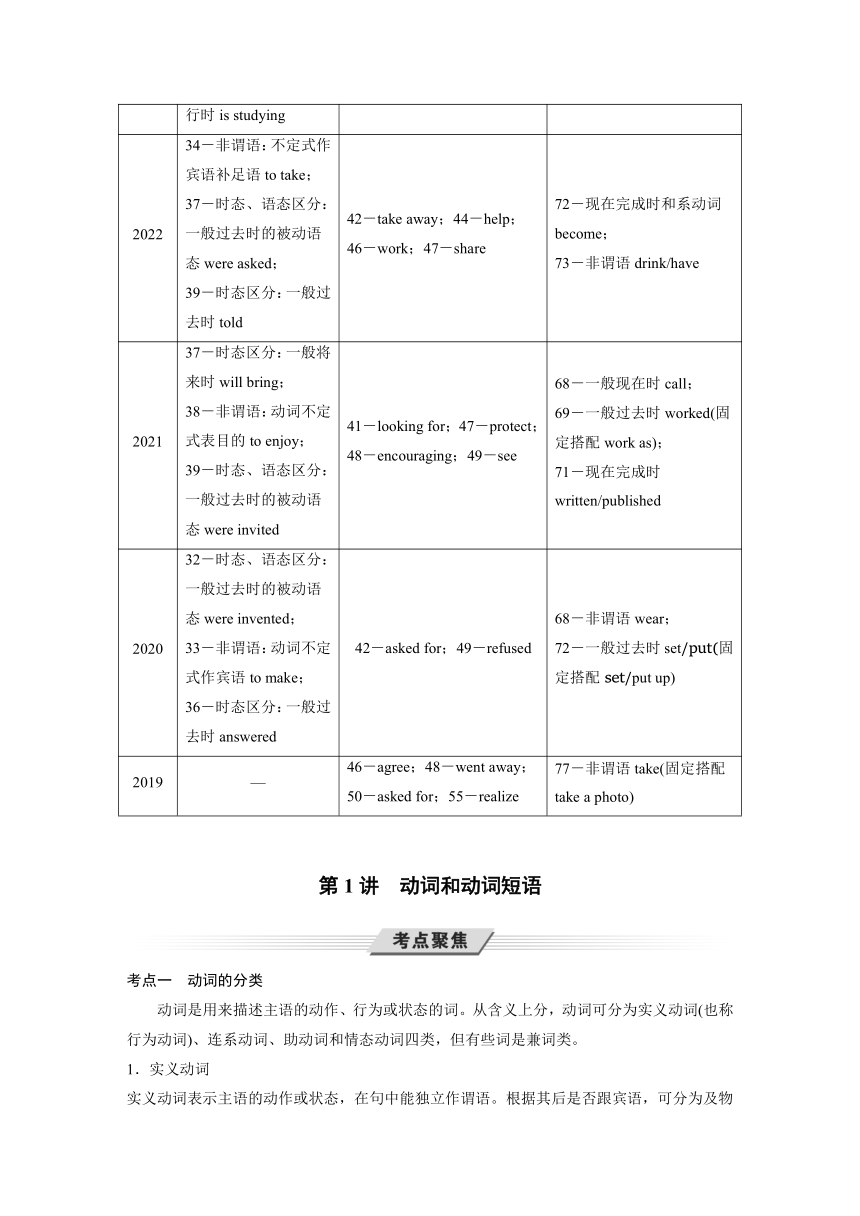
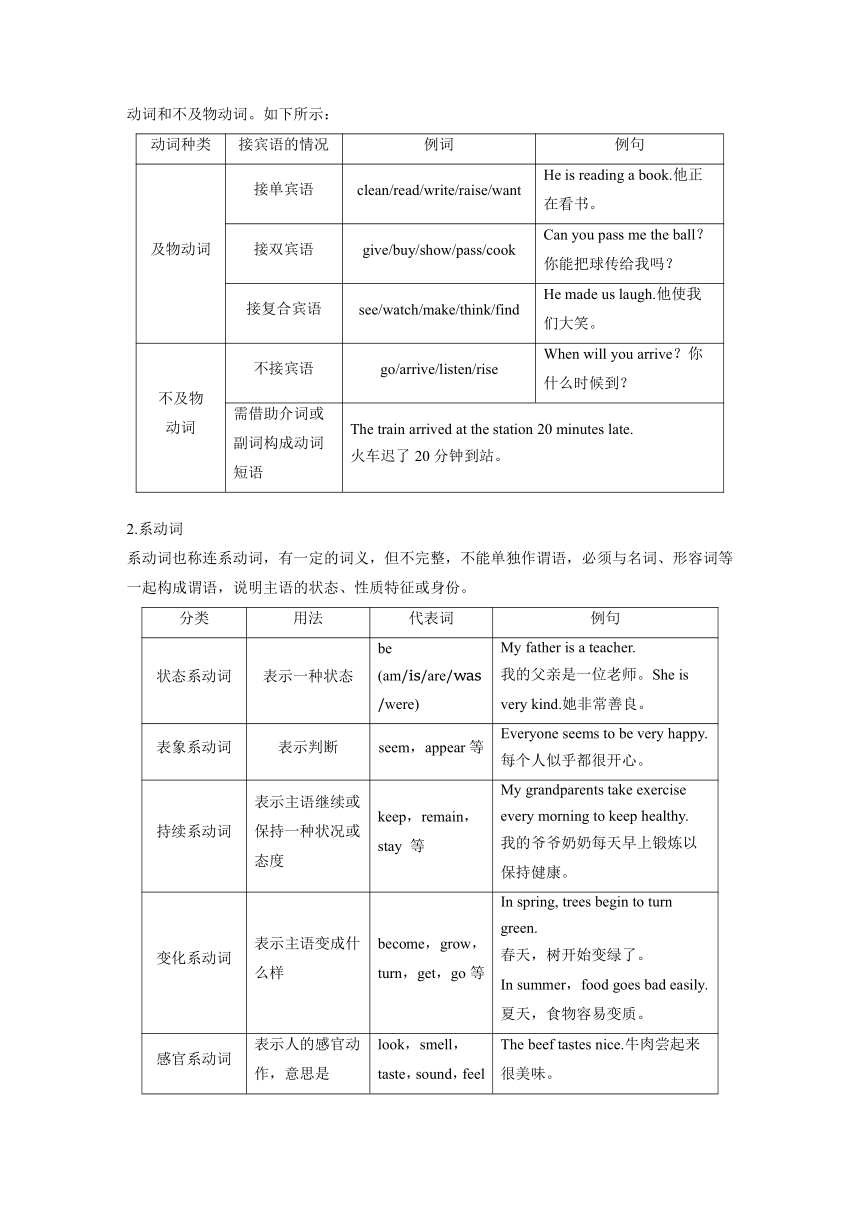
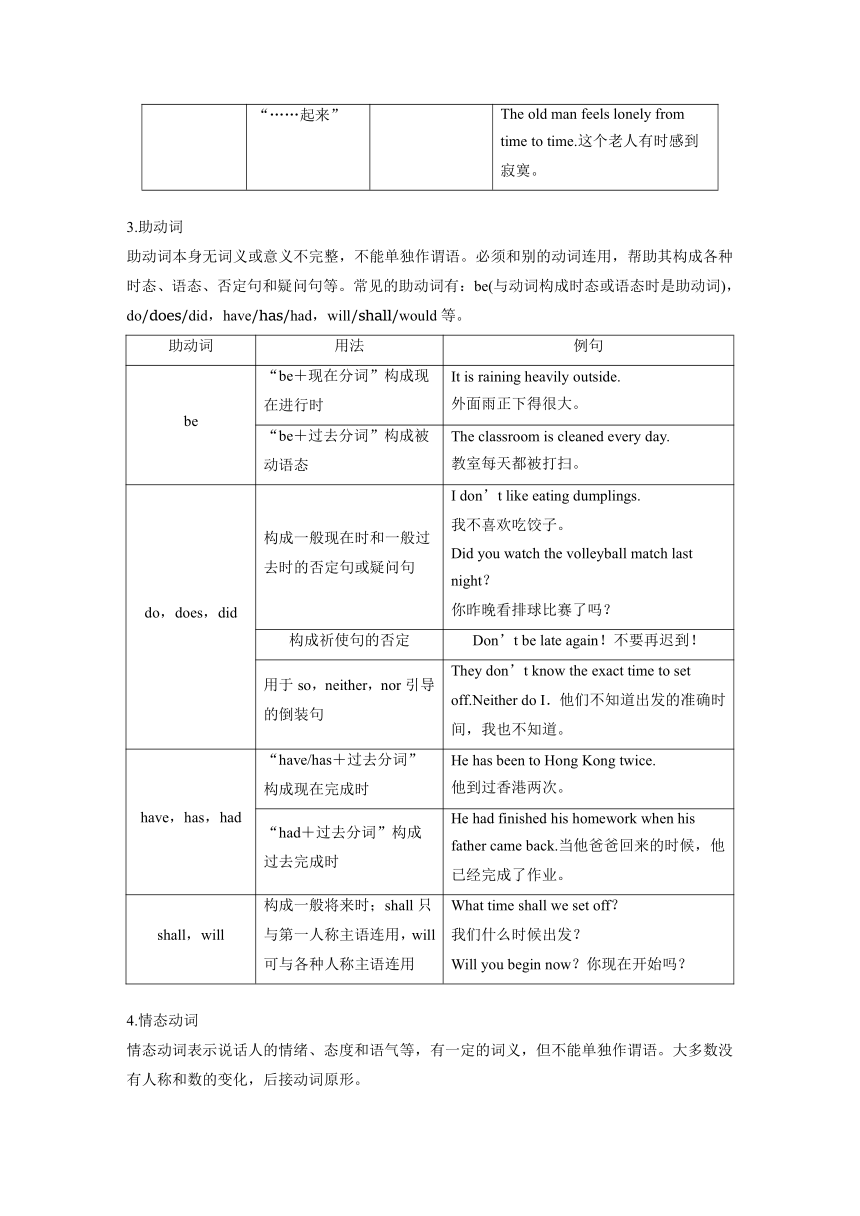
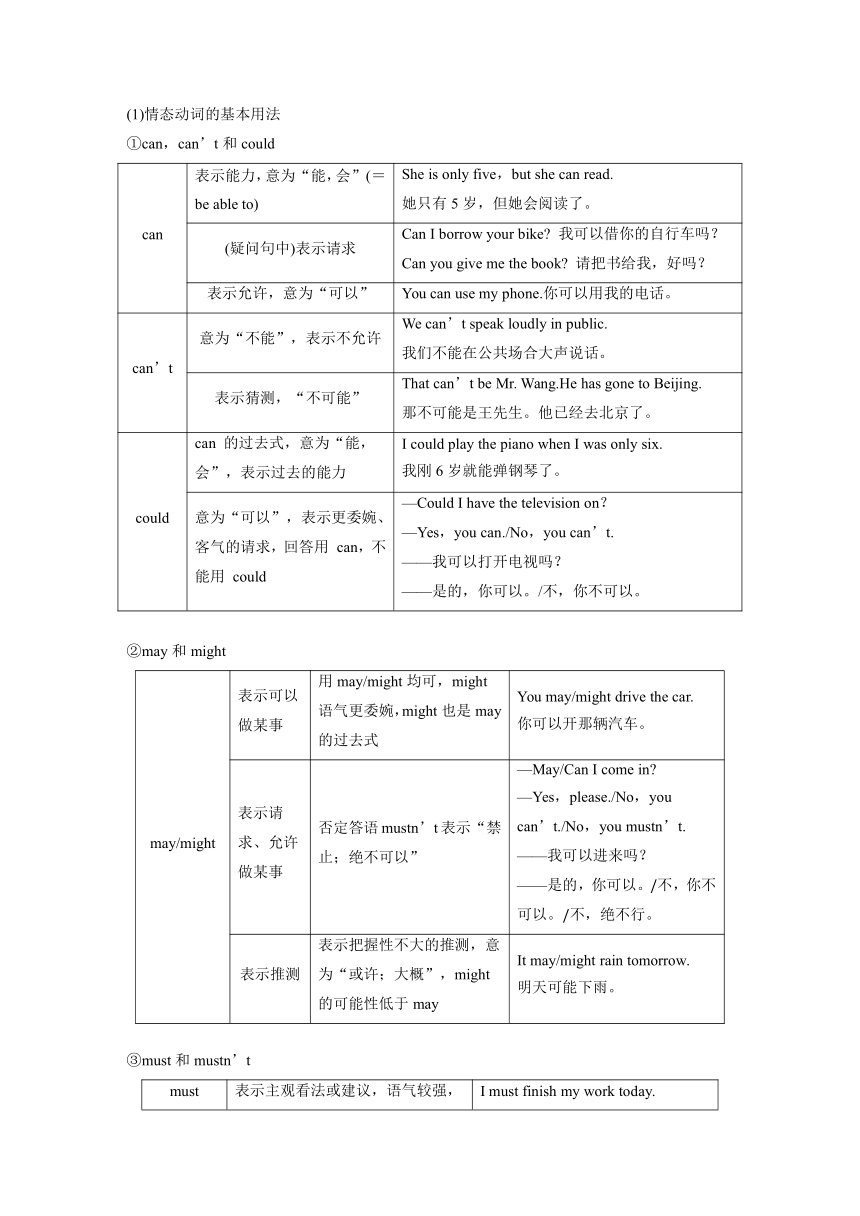
文档简介
专题二 动词
动词是语法选择、完形填空、短文填空考查的重点,着重考查其时态、语态、固定搭配和辨析。它们都有一个共同特点,就是以考查语篇理解为基础,根据上下文线索推断是关键,常在文中设置暗示和互文。因此解题时一定不能脱离语篇,盲目猜测。
年份 语法选择 完形填空 短文填空
2023 33-时态、语态区分:一般过去时的被动语态were invited; 39-非谓语:不定式作宾语to leave; 40-时态区分:现在进行时is studying 45-draw;46-changed; 48-waiting for;49-holding 68-一般过去时cleaned; 69-情态动词后的动词原形be
2022 34-非谓语:不定式作宾语补足语to take; 37-时态、语态区分:一般过去时的被动语态were asked; 39-时态区分:一般过去时told 42-take away;44-help; 46-work;47-share 72-现在完成时和系动词become; 73-非谓语drink/have
2021 37-时态区分:一般将来时will bring; 38-非谓语:动词不定式表目的to enjoy; 39-时态、语态区分:一般过去时的被动语态were invited 41-looking for;47-protect; 48-encouraging;49-see 68-一般现在时call; 69-一般过去时worked(固定搭配work as); 71-现在完成时written/published
2020 32-时态、语态区分:一般过去时的被动语态were invented; 33-非谓语:动词不定式作宾语to make; 36-时态区分:一般过去时answered 42-asked for;49-refused 68-非谓语wear; 72-一般过去时set/put(固定搭配set/put up)
2019 — 46-agree;48-went away; 50-asked for;55-realize 77-非谓语take(固定搭配take a photo)
第1讲 动词和动词短语
考点一 动词的分类
动词是用来描述主语的动作、行为或状态的词。从含义上分,动词可分为实义动词(也称行为动词)、连系动词、助动词和情态动词四类,但有些词是兼词类。
1.实义动词
实义动词表示主语的动作或状态,在句中能独立作谓语。根据其后是否跟宾语,可分为及物动词和不及物动词。如下所示:
动词种类 接宾语的情况 例词 例句
及物动词 接单宾语 clean/read/write/raise/want He is reading a book.他正在看书。
接双宾语 give/buy/show/pass/cook Can you pass me the ball? 你能把球传给我吗?
接复合宾语 see/watch/make/think/find He made us laugh.他使我们大笑。
不及物 动词 不接宾语 go/arrive/listen/rise When will you arrive?你什么时候到?
需借助介词或副词构成动词短语 The train arrived at the station 20 minutes late. 火车迟了20分钟到站。
2.系动词
系动词也称连系动词,有一定的词义,但不完整,不能单独作谓语,必须与名词、形容词等一起构成谓语,说明主语的状态、性质特征或身份。
分类 用法 代表词 例句
状态系动词 表示一种状态 be (am/is/are/was/were) My father is a teacher. 我的父亲是一位老师。She is very kind.她非常善良。
表象系动词 表示判断 seem,appear等 Everyone seems to be very happy. 每个人似乎都很开心。
持续系动词 表示主语继续或保持一种状况或态度 keep,remain,stay 等 My grandparents take exercise every morning to keep healthy. 我的爷爷奶奶每天早上锻炼以保持健康。
变化系动词 表示主语变成什么样 become,grow,turn,get,go等 In spring, trees begin to turn green. 春天,树开始变绿了。 In summer,food goes bad easily. 夏天,食物容易变质。
感官系动词 表示人的感官动作,意思是“……起来” look,smell,taste,sound,feel The beef tastes nice.牛肉尝起来很美味。 The old man feels lonely from time to time.这个老人有时感到寂寞。
3.助动词
助动词本身无词义或意义不完整,不能单独作谓语。必须和别的动词连用,帮助其构成各种时态、语态、否定句和疑问句等。常见的助动词有:be(与动词构成时态或语态时是助动词),do/does/did,have/has/had,will/shall/would等。
助动词 用法 例句
be “be+现在分词”构成现在进行时 It is raining heavily outside. 外面雨正下得很大。
“be+过去分词”构成被动语态 The classroom is cleaned every day. 教室每天都被打扫。
do,does,did 构成一般现在时和一般过去时的否定句或疑问句 I don’t like eating dumplings. 我不喜欢吃饺子。 Did you watch the volleyball match last night? 你昨晚看排球比赛了吗?
构成祈使句的否定 Don’t be late again!不要再迟到!
用于so,neither,nor引导的倒装句 They don’t know the exact time to set off.Neither do I.他们不知道出发的准确时间,我也不知道。
have,has,had “have/has+过去分词”构成现在完成时 He has been to Hong Kong twice. 他到过香港两次。
“had+过去分词”构成过去完成时 He had finished his homework when his father came back.当他爸爸回来的时候,他已经完成了作业。
shall,will 构成一般将来时;shall只与第一人称主语连用,will可与各种人称主语连用 What time shall we set off? 我们什么时候出发? Will you begin now?你现在开始吗?
4.情态动词
情态动词表示说话人的情绪、态度和语气等,有一定的词义,但不能单独作谓语。大多数没有人称和数的变化,后接动词原形。
(1)情态动词的基本用法
①can,can’t和could
can 表示能力,意为“能,会”(=be able to) She is only five,but she can read. 她只有5岁,但她会阅读了。
(疑问句中)表示请求 Can I borrow your bike 我可以借你的自行车吗? Can you give me the book 请把书给我,好吗?
表示允许,意为“可以” You can use my phone.你可以用我的电话。
can’t 意为“不能”,表示不允许 We can’t speak loudly in public. 我们不能在公共场合大声说话。
表示猜测,“不可能” That can’t be Mr. Wang.He has gone to Beijing. 那不可能是王先生。他已经去北京了。
could can 的过去式,意为“能,会”,表示过去的能力 I could play the piano when I was only six. 我刚6岁就能弹钢琴了。
意为“可以”,表示更委婉、客气的请求,回答用 can,不能用 could —Could I have the television on? —Yes,you can./No,you can’t. ——我可以打开电视吗? ——是的,你可以。/不,你不可以。
②may和might
may/might 表示可以做某事 用may/might均可,might语气更委婉,might也是may的过去式 You may/might drive the car. 你可以开那辆汽车。
表示请求、允许做某事 否定答语mustn’t表示“禁止;绝不可以” —May/Can I come in —Yes,please./No,you can’t./No,you mustn’t. ——我可以进来吗? ——是的,你可以。/不,你不可以。/不,绝不行。
表示推测 表示把握性不大的推测,意为“或许;大概”,might的可能性低于may It may/might rain tomorrow. 明天可能下雨。
③must和mustn’t
must 表示主观看法或建议,语气较强,意为“必须” I must finish my work today. 我今天必须完成我的工作。
对 must 构成的一般疑问句进行回答时,肯定回答用“Yes,sb. must.”,否定回答用“No,sb. needn’t.”或“No,sb. don’t/doesn’t have to.” —Must I go home now —No,you needn’t/don’t have to. ——我必须现在回家吗? ——不,你不必。
常用于肯定句中,表示肯定性的猜测,意为“肯定;一定是” The book must be Jack’s.There is his name on it. 这本书肯定是杰克的,书上有他的名字。
mustn’t 意为“禁止;不准;不许” You mustn’t drive after drinking. 你不许酒后驾车。
④need
need 作情态动词 多用于否定句和疑问句中,无人称和数的变化,后接动词原形,在need引起的一般疑问句中,肯定回答用must或have to,否定回答用needn’t —Need I hand in the report tomorrow? —Yes,you must./No,you needn’t. ——明天我需要交报告吗? ——是的,你需要。/不,你没必要。
作实义动词 有人称和数的变化,后接带to的不定式 As students,we need to finish our homework on time.作为学生,我们需要按时完成作业。
⑤should
should 表示义务、责任等 表示说话者的观点,可用于各种人称 You should go to class right away. 你应该马上去上课。
⑥will与shall
will/would 表示意愿 表示自愿做或主动提出做某事,可用于各种人称,would是will的过去式 Will you please pass the book to me? 请把那本书递给我好吗? My brother said he would help me to solve the problem.我哥哥说他会帮助我解决这个问题。
shall 表示征求意见或提出请求 多用于第一人称征求对方意见 What shall I wear at my birthday party?在我的生日宴会上我该穿什么好呢?
(2)情态动词表推测的用法
情态动词表示推测时,must>can>could>may>might>may not>can’t。
情态动词 含义 示例
can/could “可能”,有一定可能性,用于肯定句或疑问句 That could be a dog.那可能是一只狗。
may/might “可能”,有一定可能性,用于肯定句 It may be colder tomorrow.明天可能会更冷。
must “一定”,可能性极大,用于肯定句 She must be our new English teacher.她一定是我们的新英语老师。
can’t/couldn’t “不可能”,没有任何可能性,用于否定句 It can’t be him.He has just gone to Guangzhou. 不可能是他,他刚去了广州。
(3)情态动词的特殊回答小结
情形 肯定回答 否定回答
—Can/Could I...? —Yes,you can. —No,you can’t.
—Must I...? —Yes,you must. —No,you needn’t/don’t have to.
—Need I...? —Yes,you must. —No,you needn’t.
—May I...? —Yes,you can. —No,you can’t.
1.(2023·天津)—Would you like to visit Tianjin University tomorrow
—Sorry,I’m afraid I .I’ll work as a volunteer in my community.
A.can B.can’t C.must D.mustn’t
答案 B
2.(2023·云南)—Excuse me,may I use my phone now
—Sorry,you .The plane is taking off.
A.need B.needn’t C.can D.can’t
答案 D
3.(2023·山东滨州)—The paper cutting is pretty lively.Who made it
—It be Mary.None of us except her is able to do it.
A.can B.must C.need D.might
答案 B
4.—Sam, run in the hallways.It’s very dangerous.
—Sorry,Ms.Black.
A.do B.don’t C.not D.doesn’t
答案 B
5.The public sign in the library means people smoke there.
A.could B.must C.couldn’t D.mustn’t
答案 D
考点二 易混动词的辨析
1.arrive,reach,get to
三个 “到达” arrive in+大地点,如:arrive in Shenzhen at+小地点,如:arrive at Shenzhen Airport
get get to+地点名词(不分大小)
reach 直接加地点名词(不分大小)
I arrived in Beijing last night.我昨晚抵达北京。 I arrived at the cinema 15 minutes early.我提前15分钟到达了电影院。 The traffic was busy,so we didn’t get to the airport on time. 交通太拥挤,所以我们没能准时到达机场。 If they followed the road,they would be certain to reach a village. 如果他们沿着这条路走,就一定会到达一个村庄。
2.bring,take,carry,get
四个 “拿;带” bring 带来;拿来
take 带走;拿走
carry 表示“随身携带”,指携带或运送较大、较重的东西
get 去将某物带回来(强调动作的往返)
Don’t forget to bring your books to school.别忘了把你的书带到学校。 Don’t forget to take your books to school.别忘了带你的书去学校。 He was carrying a suitcase.他提着一个手提箱。 I had to get water from the well.我得从井里打水。
3.cost,pay,spend,take
四个 “花费” cost 物作主语,表示“某物花费多少钱”
pay sb.+pay(+钱) for
spend sb.+spend...on sth./sb.+spend...(in) doing sth.
take It takes sb. some time to do sth. sth. takes sb. some time to do sth.
The new dress cost me 300 yuan.这条新裙子花了我300元。 My father paid 600 dollars for his new computer. 我的爸爸为他的新电脑花了600美元。 Tom spends two hours doing his homework every day. 汤姆每天花两小时写作业。 It takes me half an hour to walk to school every day. 我每天花半个小时走路上学。 His death took me a year to get over. 我用一年时间慢慢接受了他去世的事实。
4.look for,find,find out
三个 “找,发现” look for 表示“找”,强调寻找的过程
find 表示“找到”,强调寻找的结果
find out 查清楚;弄明白
We all need to look for ways to protect our environment. 我们都需要寻找保护环境的方法。 I looked for my pen everywhere,but I couldn’t find it. 我到处寻找我的钢笔,但是我没找到。 Can you find out what time the meeting starts? 你能查清楚会议什么时候开始吗?
5.borrow,lend,keep
三个“借” borrow 瞬间动词,表示“借入”,常用短语:borrow sth. from sb.
lend 瞬间动词,表示“借出”,常用短语:lend sth. to sb.
keep 延续性动词,表示“借(长时间)”
I usually borrow books from the school library. 我通常从学校图书馆借书。 Can you lend me your English dictionary? 你能借给我你的英语词典吗? I have kept this book for 3 weeks.我借这本书三周了。
6.put on,wear,dress,have...on
四个 “穿;戴” put on 瞬间动词短语,表示“穿;戴”
wear 延续性动词,表示“穿着;戴着”
dress dress sb.给某人穿衣服 be dressed in穿着……的衣服
have...on 穿着……
She put on her coat and went out.她穿上大衣出去了。 Do the children have to wear the school uniform?孩子们必须穿校服吗? She was dressed in a beautiful dress.她身穿一条漂亮的裙子。 She had a red jacket on.她穿着一件红夹克。
7.say,speak,talk,tell
四个 “说;讲” say 表示“说”,后加说话内容
speak 表示“谈话,交谈,说话”,后加某种语言,意为“讲……语”
talk 表示“谈话;商谈;讨论”,常用短语:talk with/to sb.,talk about sth.
He says he is a teacher.他说他是一名老师。 Can you speak English?你能说英语吗? Lily is talking with her friend on the phone.莉莉正在和朋友打电话。 Listen,they are talking about our English teacher. 听,他们在谈论我们的英语老师。
8.see,watch,look,read
四个“看” see 表示“看到”,强调看的结果
watch 表示“观看;观赏”,例如看电视、比赛或演出等
look 不及物动词,强调看的动作
read 表示“看(书;报纸)”,指阅读
I saw some pandas in the zoo.我在动物园看到了一些熊猫。 Ben likes watching football matches on TV.本喜欢在电视上看足球赛。 She looked at me and smiled.她看了看我,笑了。 My father reads newspapers every morning.我爸爸每天早上都看报。
9.listen,hear
两个“听” listen 表示“听”,强调听的动作,常用短语:listen to
hear 表示“听到”,强调听的结果
Do you like listening to music?你喜欢听音乐吗? Can you hear me?你能听到我说话吗?
10.win,beat,fail,lose
四个 “输赢” win 表示“赢得”,后加比赛或奖项
beat 表示“击败”,后加对手
fail 表示“失败;未做成(某事)”,后加考试或to do sth.
lose 表示“输掉”,后加比赛
He was very happy after winning the competition. 他赢了那场比赛后高兴极了。 He beat me at chess.他下棋赢了我。 Linda feels very sad because she failed her English exam. 琳达很难过,因为她英语考试不及格。 Our team lost the basketball match,but we still had a great time. 虽然我们队输掉了这场篮球赛,但我们仍然玩得很开心。
11.join,take part in,join in,attend
四个 “参加” join 加入组织、军队、群体并成为其中一员
take part in 参加聚会或活动并发挥作用
join in 参加聚会或活动
attend 定期出席、参加会议、上学、参加婚礼、参加葬礼
I want to join the basketball club.我想加入篮球俱乐部。 Many students enjoy taking part in different kinds of after-school activities. 很多学生喜欢参加各种各样的课外活动。 Be prepared to join in a class discussion.一定准备好参加班级讨论。 I’ll attend an important meeting tomorrow.明天我要出席一个重要会议。
12.receive,accept
两个 “接收” receive 收到
accept 接受
I receive many birthday gifts every year.我每年都收到很多生日礼物。 I accepted his invitation to his birthday party.我接受了参加他生日派对的邀请。
13.forget,leave
两个 “忘记” forget 表示“忘记”,forget+名词/to do sth./doing sth.
leave 表示“落在……”,leave+名词+介词+地点
I forgot to close the window when I went out.我出门的时候忘记关窗了。 My sister left her Chinese book at home.我妹妹把她的语文书落在家里了。
14.invent,discover
一个“发明”, 一个“发现” invent 发明
discover 发现
Who invented the telephone?谁发明了电话? We discovered this beach while we were sailing around the island. 我们在围绕这个海岛航行时发现了这个海滩。
1.(2023·江苏扬州)I China for three months and this is the first time I’ve tried on hanfu.
A.have gone to B.have been to C.have arrived in D.have been in
答案 D
2.(2023·山东滨州)—Our parents often us not to talk with strangers on the Internet.
—That’s true.As teenagers,we should learn to protect ourselves.
A.warn B.invite C.control D.promise
答案 A
3.—Paul,have you tried this chicken It’s a special in Luzhou and has been introduced in the TV programme A Bite of China.
—Yes,it hot but delicious.
A.eats B.looks C.tastes D.sees
答案 C
4.—Can you guess who will this match tonight
—Everything is possible.It’s hard to say.
A.beat B.win C.act D.get
答案 B
5.With the help of the Internet,the information can every corner of the world.
A.arrive in B.get C.reach D.arrive
答案 C
考点三 动词短语
1.同一动词型
come短语 come in进来 come from来自 come back回来 come up with想出(主意) come out出版
take短语 take photos拍照 take a message传口信 take part in参加 take care of照顾 take care保重 take place发生 take action采取行动 take up占据(空间),占用(时间) take a walk散步 take after与……相像 take away带走 take down拆除 take off起飞,脱掉 take pride in以……为骄傲
put短语 put on穿上 put up张贴;搭建 put out熄灭 put off推迟 put away收起
get短语 get ready for sth.为……准备好 get together 聚会 get off下车 get on上车 get lost 迷路 get/be used to习惯于,适应于 get along/on with与……和睦相处 get over克服 get up起床
turn短语 turn...into...把……变成…… turn off关掉(开关) turn on打开(开关) turn up把声音调高 turn down把声音调低
look短语 look up查阅 look out当心 look after照顾 look through浏览,快速查看 look at看一看 look for寻找 look forward to期待 look out of从……往外看 look over检查 look around环顾
make短语 make up one’s mind决定 make friends with sb.与某人交朋友 make a difference (to sb./sth) (对……)有影响,起作用 make up编造 make a fire生火 make a mistake犯错误
have短语 have breakfast吃早饭 have lessons上课 have a good time过得愉快,玩得高兴 have to不得不 have difficulty (in) doing sth.做某事费劲 have nothing to do with与……无关
2.同一介词/副词型
up短语 call up打电话 cheer up使……高兴 cut up切碎 fix up修理 pick up捡起 take up占据,开始做 clean up打扫 look up查阅 set up建立 show up出现,露面 wake up醒来 use up用光 make up编造 stay up熬夜 grow up长大,成长 give up放弃
down短语 write down写下 sit down坐下 cut down砍倒 fall down倒塌 die down逐渐变弱
about短语 talk about谈论 think about考虑 worry about担心 learn about了解
for短语 ask for请求 pay for支付 care for照顾 leave for动身去 wait for等待
out短语 get out出去 find out发现 look out小心 run out用光 work out解决 hang out闲逛
on短语 depend on依靠
with短语 agree with同意某人的意见 play with玩弄 deal with处理,应付 begin with以……开始 talk with与……说话 connect...with...把……和……联系起来
3.其他常考短语
show sb. around领某人参观
borrow...from...向……借……
laugh at嘲笑
have something to do with与……有关
think twice三思而行
knock on/at the door 敲门
give away赠送
hear from收到某人的来信
hear of听说
dream of梦想
1.(2023·安徽)Our team what to do about the project and successfully completed it on time.
A.gave up B.worked out C.turned down D.took away
答案 B
2.(2023·山东滨州)—Do you know the astronaut Wang Yaping
—Sure.She is a great woman who can her dreams.I really look up to her.
A.pay for B.stick to C.lay out D.set out
答案 B
3.(2023·江苏扬州)Paper cut-outs of “double happiness” are often in the married couple’s home to bring good wishes.
A.put back B.put up C.put on D.put off
答案 B
4.(2023·云南)It’s a good habit to the lights when you leave a room.
A.turn down B.turn up C.turn off D.turn on
答案 C
5.—Maria,don’t forget to the sports shoes.You have a P.E.class today.
—Thanks,mom.I won’t.
A.get up B.put on C.take off D.cut down
答案 B
广东近5 年中考完形填空中,主要是实义动词词义的辨析,重点考查考生对语篇上下文的理解和逻辑推理能力。
1.(2023·广东)Day by day,the weather got cooler. The leaves slowly their colour and tiny apples appeared among them.
A.shared B.found C.passed D.changed
答案 D
解析 根据语境和常识可知,应选changed,意为“改变”。
2.(2022·广东)People in the community came to .They brought us food and often called to make sure we were doing fine.
A.cry B.see C.help D.rest
答案 C
解析 cry哭泣;see看见;help帮助;rest休息。根据下文“他们带食物给我们,常常打电话来慰问,确保我们安好”可推测此空应是“帮忙”,故选 C。
3.(2021·广东)This job is to the earth from germs(细菌) on things brought back from other planets.
A.move B.protect C.pull D.collect
答案 B
解析 move移动;protect保护;pull拉;collect收集。固定搭配:protect...from...保护……免受伤害。故选B。
4.(2019·广东)Some days they could spend hours happily together without any argument,but other days they just could not on what to do.
A.agree B.live C.depend D.try
答案 A
解析 句意:有时他们可以在一起快乐地度过几个小时,没有任何争吵,但有时他们就是不能就做什么达成一致。固定搭配:agree on sth.就某事达成一致意见。故选A。
[对点训练]
I used to think my body shape was something out of my control.All my family are fat.I would become a fat person because of the genes(基因).So I 1 doing anything to change that,I didn’t care what I 2 or drank,and I didn’t do exercise either.As a result,I got fat and was in poor health.When seeing my doctor,I 3 if I’d like to help myself to be healthy.I said I was fat because of my family.He 4 his head and said I was wrong.He told me that my genes only gave me a two percent chance of being fat.However,my lifestyle 5 me to be fat.
1.A.thought about B.gave up C.asked for D.looked for
答案 B
2.A.thought B.hoped C.ate D.needed
答案 C
3.A.was asked B.was doubted C.was explained D.was worried
答案 A
4.A.hit B.touched C.nodded D.shook
答案 D
5.A.decided B.reminded C.warned D.supported
答案 A
动词的类型有很多,有实义动词、连系动词、情态动词、助动词等,中考短文填空中重点考查2~3个实义动词(含时态和形式)。
1.(2023·广东)
It might the world’s earliest form of toothbrushes.
答案 be
解析 根据句意和方框中词汇可知,设空处应用be,又因为空前有情态动词might,故用原形。故填be。
2.(2020·广东)She felt sad that the kids there didn’t have new clothes to and toys to play with.
答案 wear
解析 动词不定式作为后置定语修饰clothes,和下文的 to play with 修饰toys 的结构一样,故填动词原形 wear。
3.(2020·广东)With the help of her mother,Jane up her first lemonade stand(摊档).
答案 set/put
解析 句意:在她妈妈的帮助下,她摆起了她的第一个柠檬水摊。set/put up 意为“建立,设立”。
4.(2019·广东)I liked him so much that I asked a visitor to a photo of that painting and me.
答案 take
解析 take a photo of给……拍照片,固定搭配;再由不定式符号to判断填原形。故填take。
[对点训练]
请从方框内选择适当的词并用其正确形式填空,使文章完整连贯。注意每空一词,每词仅用一次,有两词为多余项。
A rich man 1.lived in a small town.He was very rich but his son had started hanging out with a bad crowd.The father 2.tried to warn his son about this but failed,because his son wouldn’t listen.One day,an old wise man came to the town.The father went to the wise man to 3.ask for advice.After 4.thinking for a while,the wise man replied,“Send your son to me tomorrow morning.I will talk to him and 5.tell him what to do.”
动词是语法选择、完形填空、短文填空考查的重点,着重考查其时态、语态、固定搭配和辨析。它们都有一个共同特点,就是以考查语篇理解为基础,根据上下文线索推断是关键,常在文中设置暗示和互文。因此解题时一定不能脱离语篇,盲目猜测。
年份 语法选择 完形填空 短文填空
2023 33-时态、语态区分:一般过去时的被动语态were invited; 39-非谓语:不定式作宾语to leave; 40-时态区分:现在进行时is studying 45-draw;46-changed; 48-waiting for;49-holding 68-一般过去时cleaned; 69-情态动词后的动词原形be
2022 34-非谓语:不定式作宾语补足语to take; 37-时态、语态区分:一般过去时的被动语态were asked; 39-时态区分:一般过去时told 42-take away;44-help; 46-work;47-share 72-现在完成时和系动词become; 73-非谓语drink/have
2021 37-时态区分:一般将来时will bring; 38-非谓语:动词不定式表目的to enjoy; 39-时态、语态区分:一般过去时的被动语态were invited 41-looking for;47-protect; 48-encouraging;49-see 68-一般现在时call; 69-一般过去时worked(固定搭配work as); 71-现在完成时written/published
2020 32-时态、语态区分:一般过去时的被动语态were invented; 33-非谓语:动词不定式作宾语to make; 36-时态区分:一般过去时answered 42-asked for;49-refused 68-非谓语wear; 72-一般过去时set/put(固定搭配set/put up)
2019 — 46-agree;48-went away; 50-asked for;55-realize 77-非谓语take(固定搭配take a photo)
第1讲 动词和动词短语
考点一 动词的分类
动词是用来描述主语的动作、行为或状态的词。从含义上分,动词可分为实义动词(也称行为动词)、连系动词、助动词和情态动词四类,但有些词是兼词类。
1.实义动词
实义动词表示主语的动作或状态,在句中能独立作谓语。根据其后是否跟宾语,可分为及物动词和不及物动词。如下所示:
动词种类 接宾语的情况 例词 例句
及物动词 接单宾语 clean/read/write/raise/want He is reading a book.他正在看书。
接双宾语 give/buy/show/pass/cook Can you pass me the ball? 你能把球传给我吗?
接复合宾语 see/watch/make/think/find He made us laugh.他使我们大笑。
不及物 动词 不接宾语 go/arrive/listen/rise When will you arrive?你什么时候到?
需借助介词或副词构成动词短语 The train arrived at the station 20 minutes late. 火车迟了20分钟到站。
2.系动词
系动词也称连系动词,有一定的词义,但不完整,不能单独作谓语,必须与名词、形容词等一起构成谓语,说明主语的状态、性质特征或身份。
分类 用法 代表词 例句
状态系动词 表示一种状态 be (am/is/are/was/were) My father is a teacher. 我的父亲是一位老师。She is very kind.她非常善良。
表象系动词 表示判断 seem,appear等 Everyone seems to be very happy. 每个人似乎都很开心。
持续系动词 表示主语继续或保持一种状况或态度 keep,remain,stay 等 My grandparents take exercise every morning to keep healthy. 我的爷爷奶奶每天早上锻炼以保持健康。
变化系动词 表示主语变成什么样 become,grow,turn,get,go等 In spring, trees begin to turn green. 春天,树开始变绿了。 In summer,food goes bad easily. 夏天,食物容易变质。
感官系动词 表示人的感官动作,意思是“……起来” look,smell,taste,sound,feel The beef tastes nice.牛肉尝起来很美味。 The old man feels lonely from time to time.这个老人有时感到寂寞。
3.助动词
助动词本身无词义或意义不完整,不能单独作谓语。必须和别的动词连用,帮助其构成各种时态、语态、否定句和疑问句等。常见的助动词有:be(与动词构成时态或语态时是助动词),do/does/did,have/has/had,will/shall/would等。
助动词 用法 例句
be “be+现在分词”构成现在进行时 It is raining heavily outside. 外面雨正下得很大。
“be+过去分词”构成被动语态 The classroom is cleaned every day. 教室每天都被打扫。
do,does,did 构成一般现在时和一般过去时的否定句或疑问句 I don’t like eating dumplings. 我不喜欢吃饺子。 Did you watch the volleyball match last night? 你昨晚看排球比赛了吗?
构成祈使句的否定 Don’t be late again!不要再迟到!
用于so,neither,nor引导的倒装句 They don’t know the exact time to set off.Neither do I.他们不知道出发的准确时间,我也不知道。
have,has,had “have/has+过去分词”构成现在完成时 He has been to Hong Kong twice. 他到过香港两次。
“had+过去分词”构成过去完成时 He had finished his homework when his father came back.当他爸爸回来的时候,他已经完成了作业。
shall,will 构成一般将来时;shall只与第一人称主语连用,will可与各种人称主语连用 What time shall we set off? 我们什么时候出发? Will you begin now?你现在开始吗?
4.情态动词
情态动词表示说话人的情绪、态度和语气等,有一定的词义,但不能单独作谓语。大多数没有人称和数的变化,后接动词原形。
(1)情态动词的基本用法
①can,can’t和could
can 表示能力,意为“能,会”(=be able to) She is only five,but she can read. 她只有5岁,但她会阅读了。
(疑问句中)表示请求 Can I borrow your bike 我可以借你的自行车吗? Can you give me the book 请把书给我,好吗?
表示允许,意为“可以” You can use my phone.你可以用我的电话。
can’t 意为“不能”,表示不允许 We can’t speak loudly in public. 我们不能在公共场合大声说话。
表示猜测,“不可能” That can’t be Mr. Wang.He has gone to Beijing. 那不可能是王先生。他已经去北京了。
could can 的过去式,意为“能,会”,表示过去的能力 I could play the piano when I was only six. 我刚6岁就能弹钢琴了。
意为“可以”,表示更委婉、客气的请求,回答用 can,不能用 could —Could I have the television on? —Yes,you can./No,you can’t. ——我可以打开电视吗? ——是的,你可以。/不,你不可以。
②may和might
may/might 表示可以做某事 用may/might均可,might语气更委婉,might也是may的过去式 You may/might drive the car. 你可以开那辆汽车。
表示请求、允许做某事 否定答语mustn’t表示“禁止;绝不可以” —May/Can I come in —Yes,please./No,you can’t./No,you mustn’t. ——我可以进来吗? ——是的,你可以。/不,你不可以。/不,绝不行。
表示推测 表示把握性不大的推测,意为“或许;大概”,might的可能性低于may It may/might rain tomorrow. 明天可能下雨。
③must和mustn’t
must 表示主观看法或建议,语气较强,意为“必须” I must finish my work today. 我今天必须完成我的工作。
对 must 构成的一般疑问句进行回答时,肯定回答用“Yes,sb. must.”,否定回答用“No,sb. needn’t.”或“No,sb. don’t/doesn’t have to.” —Must I go home now —No,you needn’t/don’t have to. ——我必须现在回家吗? ——不,你不必。
常用于肯定句中,表示肯定性的猜测,意为“肯定;一定是” The book must be Jack’s.There is his name on it. 这本书肯定是杰克的,书上有他的名字。
mustn’t 意为“禁止;不准;不许” You mustn’t drive after drinking. 你不许酒后驾车。
④need
need 作情态动词 多用于否定句和疑问句中,无人称和数的变化,后接动词原形,在need引起的一般疑问句中,肯定回答用must或have to,否定回答用needn’t —Need I hand in the report tomorrow? —Yes,you must./No,you needn’t. ——明天我需要交报告吗? ——是的,你需要。/不,你没必要。
作实义动词 有人称和数的变化,后接带to的不定式 As students,we need to finish our homework on time.作为学生,我们需要按时完成作业。
⑤should
should 表示义务、责任等 表示说话者的观点,可用于各种人称 You should go to class right away. 你应该马上去上课。
⑥will与shall
will/would 表示意愿 表示自愿做或主动提出做某事,可用于各种人称,would是will的过去式 Will you please pass the book to me? 请把那本书递给我好吗? My brother said he would help me to solve the problem.我哥哥说他会帮助我解决这个问题。
shall 表示征求意见或提出请求 多用于第一人称征求对方意见 What shall I wear at my birthday party?在我的生日宴会上我该穿什么好呢?
(2)情态动词表推测的用法
情态动词表示推测时,must>can>could>may>might>may not>can’t。
情态动词 含义 示例
can/could “可能”,有一定可能性,用于肯定句或疑问句 That could be a dog.那可能是一只狗。
may/might “可能”,有一定可能性,用于肯定句 It may be colder tomorrow.明天可能会更冷。
must “一定”,可能性极大,用于肯定句 She must be our new English teacher.她一定是我们的新英语老师。
can’t/couldn’t “不可能”,没有任何可能性,用于否定句 It can’t be him.He has just gone to Guangzhou. 不可能是他,他刚去了广州。
(3)情态动词的特殊回答小结
情形 肯定回答 否定回答
—Can/Could I...? —Yes,you can. —No,you can’t.
—Must I...? —Yes,you must. —No,you needn’t/don’t have to.
—Need I...? —Yes,you must. —No,you needn’t.
—May I...? —Yes,you can. —No,you can’t.
1.(2023·天津)—Would you like to visit Tianjin University tomorrow
—Sorry,I’m afraid I .I’ll work as a volunteer in my community.
A.can B.can’t C.must D.mustn’t
答案 B
2.(2023·云南)—Excuse me,may I use my phone now
—Sorry,you .The plane is taking off.
A.need B.needn’t C.can D.can’t
答案 D
3.(2023·山东滨州)—The paper cutting is pretty lively.Who made it
—It be Mary.None of us except her is able to do it.
A.can B.must C.need D.might
答案 B
4.—Sam, run in the hallways.It’s very dangerous.
—Sorry,Ms.Black.
A.do B.don’t C.not D.doesn’t
答案 B
5.The public sign in the library means people smoke there.
A.could B.must C.couldn’t D.mustn’t
答案 D
考点二 易混动词的辨析
1.arrive,reach,get to
三个 “到达” arrive in+大地点,如:arrive in Shenzhen at+小地点,如:arrive at Shenzhen Airport
get get to+地点名词(不分大小)
reach 直接加地点名词(不分大小)
I arrived in Beijing last night.我昨晚抵达北京。 I arrived at the cinema 15 minutes early.我提前15分钟到达了电影院。 The traffic was busy,so we didn’t get to the airport on time. 交通太拥挤,所以我们没能准时到达机场。 If they followed the road,they would be certain to reach a village. 如果他们沿着这条路走,就一定会到达一个村庄。
2.bring,take,carry,get
四个 “拿;带” bring 带来;拿来
take 带走;拿走
carry 表示“随身携带”,指携带或运送较大、较重的东西
get 去将某物带回来(强调动作的往返)
Don’t forget to bring your books to school.别忘了把你的书带到学校。 Don’t forget to take your books to school.别忘了带你的书去学校。 He was carrying a suitcase.他提着一个手提箱。 I had to get water from the well.我得从井里打水。
3.cost,pay,spend,take
四个 “花费” cost 物作主语,表示“某物花费多少钱”
pay sb.+pay(+钱) for
spend sb.+spend...on sth./sb.+spend...(in) doing sth.
take It takes sb. some time to do sth. sth. takes sb. some time to do sth.
The new dress cost me 300 yuan.这条新裙子花了我300元。 My father paid 600 dollars for his new computer. 我的爸爸为他的新电脑花了600美元。 Tom spends two hours doing his homework every day. 汤姆每天花两小时写作业。 It takes me half an hour to walk to school every day. 我每天花半个小时走路上学。 His death took me a year to get over. 我用一年时间慢慢接受了他去世的事实。
4.look for,find,find out
三个 “找,发现” look for 表示“找”,强调寻找的过程
find 表示“找到”,强调寻找的结果
find out 查清楚;弄明白
We all need to look for ways to protect our environment. 我们都需要寻找保护环境的方法。 I looked for my pen everywhere,but I couldn’t find it. 我到处寻找我的钢笔,但是我没找到。 Can you find out what time the meeting starts? 你能查清楚会议什么时候开始吗?
5.borrow,lend,keep
三个“借” borrow 瞬间动词,表示“借入”,常用短语:borrow sth. from sb.
lend 瞬间动词,表示“借出”,常用短语:lend sth. to sb.
keep 延续性动词,表示“借(长时间)”
I usually borrow books from the school library. 我通常从学校图书馆借书。 Can you lend me your English dictionary? 你能借给我你的英语词典吗? I have kept this book for 3 weeks.我借这本书三周了。
6.put on,wear,dress,have...on
四个 “穿;戴” put on 瞬间动词短语,表示“穿;戴”
wear 延续性动词,表示“穿着;戴着”
dress dress sb.给某人穿衣服 be dressed in穿着……的衣服
have...on 穿着……
She put on her coat and went out.她穿上大衣出去了。 Do the children have to wear the school uniform?孩子们必须穿校服吗? She was dressed in a beautiful dress.她身穿一条漂亮的裙子。 She had a red jacket on.她穿着一件红夹克。
7.say,speak,talk,tell
四个 “说;讲” say 表示“说”,后加说话内容
speak 表示“谈话,交谈,说话”,后加某种语言,意为“讲……语”
talk 表示“谈话;商谈;讨论”,常用短语:talk with/to sb.,talk about sth.
He says he is a teacher.他说他是一名老师。 Can you speak English?你能说英语吗? Lily is talking with her friend on the phone.莉莉正在和朋友打电话。 Listen,they are talking about our English teacher. 听,他们在谈论我们的英语老师。
8.see,watch,look,read
四个“看” see 表示“看到”,强调看的结果
watch 表示“观看;观赏”,例如看电视、比赛或演出等
look 不及物动词,强调看的动作
read 表示“看(书;报纸)”,指阅读
I saw some pandas in the zoo.我在动物园看到了一些熊猫。 Ben likes watching football matches on TV.本喜欢在电视上看足球赛。 She looked at me and smiled.她看了看我,笑了。 My father reads newspapers every morning.我爸爸每天早上都看报。
9.listen,hear
两个“听” listen 表示“听”,强调听的动作,常用短语:listen to
hear 表示“听到”,强调听的结果
Do you like listening to music?你喜欢听音乐吗? Can you hear me?你能听到我说话吗?
10.win,beat,fail,lose
四个 “输赢” win 表示“赢得”,后加比赛或奖项
beat 表示“击败”,后加对手
fail 表示“失败;未做成(某事)”,后加考试或to do sth.
lose 表示“输掉”,后加比赛
He was very happy after winning the competition. 他赢了那场比赛后高兴极了。 He beat me at chess.他下棋赢了我。 Linda feels very sad because she failed her English exam. 琳达很难过,因为她英语考试不及格。 Our team lost the basketball match,but we still had a great time. 虽然我们队输掉了这场篮球赛,但我们仍然玩得很开心。
11.join,take part in,join in,attend
四个 “参加” join 加入组织、军队、群体并成为其中一员
take part in 参加聚会或活动并发挥作用
join in 参加聚会或活动
attend 定期出席、参加会议、上学、参加婚礼、参加葬礼
I want to join the basketball club.我想加入篮球俱乐部。 Many students enjoy taking part in different kinds of after-school activities. 很多学生喜欢参加各种各样的课外活动。 Be prepared to join in a class discussion.一定准备好参加班级讨论。 I’ll attend an important meeting tomorrow.明天我要出席一个重要会议。
12.receive,accept
两个 “接收” receive 收到
accept 接受
I receive many birthday gifts every year.我每年都收到很多生日礼物。 I accepted his invitation to his birthday party.我接受了参加他生日派对的邀请。
13.forget,leave
两个 “忘记” forget 表示“忘记”,forget+名词/to do sth./doing sth.
leave 表示“落在……”,leave+名词+介词+地点
I forgot to close the window when I went out.我出门的时候忘记关窗了。 My sister left her Chinese book at home.我妹妹把她的语文书落在家里了。
14.invent,discover
一个“发明”, 一个“发现” invent 发明
discover 发现
Who invented the telephone?谁发明了电话? We discovered this beach while we were sailing around the island. 我们在围绕这个海岛航行时发现了这个海滩。
1.(2023·江苏扬州)I China for three months and this is the first time I’ve tried on hanfu.
A.have gone to B.have been to C.have arrived in D.have been in
答案 D
2.(2023·山东滨州)—Our parents often us not to talk with strangers on the Internet.
—That’s true.As teenagers,we should learn to protect ourselves.
A.warn B.invite C.control D.promise
答案 A
3.—Paul,have you tried this chicken It’s a special in Luzhou and has been introduced in the TV programme A Bite of China.
—Yes,it hot but delicious.
A.eats B.looks C.tastes D.sees
答案 C
4.—Can you guess who will this match tonight
—Everything is possible.It’s hard to say.
A.beat B.win C.act D.get
答案 B
5.With the help of the Internet,the information can every corner of the world.
A.arrive in B.get C.reach D.arrive
答案 C
考点三 动词短语
1.同一动词型
come短语 come in进来 come from来自 come back回来 come up with想出(主意) come out出版
take短语 take photos拍照 take a message传口信 take part in参加 take care of照顾 take care保重 take place发生 take action采取行动 take up占据(空间),占用(时间) take a walk散步 take after与……相像 take away带走 take down拆除 take off起飞,脱掉 take pride in以……为骄傲
put短语 put on穿上 put up张贴;搭建 put out熄灭 put off推迟 put away收起
get短语 get ready for sth.为……准备好 get together 聚会 get off下车 get on上车 get lost 迷路 get/be used to习惯于,适应于 get along/on with与……和睦相处 get over克服 get up起床
turn短语 turn...into...把……变成…… turn off关掉(开关) turn on打开(开关) turn up把声音调高 turn down把声音调低
look短语 look up查阅 look out当心 look after照顾 look through浏览,快速查看 look at看一看 look for寻找 look forward to期待 look out of从……往外看 look over检查 look around环顾
make短语 make up one’s mind决定 make friends with sb.与某人交朋友 make a difference (to sb./sth) (对……)有影响,起作用 make up编造 make a fire生火 make a mistake犯错误
have短语 have breakfast吃早饭 have lessons上课 have a good time过得愉快,玩得高兴 have to不得不 have difficulty (in) doing sth.做某事费劲 have nothing to do with与……无关
2.同一介词/副词型
up短语 call up打电话 cheer up使……高兴 cut up切碎 fix up修理 pick up捡起 take up占据,开始做 clean up打扫 look up查阅 set up建立 show up出现,露面 wake up醒来 use up用光 make up编造 stay up熬夜 grow up长大,成长 give up放弃
down短语 write down写下 sit down坐下 cut down砍倒 fall down倒塌 die down逐渐变弱
about短语 talk about谈论 think about考虑 worry about担心 learn about了解
for短语 ask for请求 pay for支付 care for照顾 leave for动身去 wait for等待
out短语 get out出去 find out发现 look out小心 run out用光 work out解决 hang out闲逛
on短语 depend on依靠
with短语 agree with同意某人的意见 play with玩弄 deal with处理,应付 begin with以……开始 talk with与……说话 connect...with...把……和……联系起来
3.其他常考短语
show sb. around领某人参观
borrow...from...向……借……
laugh at嘲笑
have something to do with与……有关
think twice三思而行
knock on/at the door 敲门
give away赠送
hear from收到某人的来信
hear of听说
dream of梦想
1.(2023·安徽)Our team what to do about the project and successfully completed it on time.
A.gave up B.worked out C.turned down D.took away
答案 B
2.(2023·山东滨州)—Do you know the astronaut Wang Yaping
—Sure.She is a great woman who can her dreams.I really look up to her.
A.pay for B.stick to C.lay out D.set out
答案 B
3.(2023·江苏扬州)Paper cut-outs of “double happiness” are often in the married couple’s home to bring good wishes.
A.put back B.put up C.put on D.put off
答案 B
4.(2023·云南)It’s a good habit to the lights when you leave a room.
A.turn down B.turn up C.turn off D.turn on
答案 C
5.—Maria,don’t forget to the sports shoes.You have a P.E.class today.
—Thanks,mom.I won’t.
A.get up B.put on C.take off D.cut down
答案 B
广东近5 年中考完形填空中,主要是实义动词词义的辨析,重点考查考生对语篇上下文的理解和逻辑推理能力。
1.(2023·广东)Day by day,the weather got cooler. The leaves slowly their colour and tiny apples appeared among them.
A.shared B.found C.passed D.changed
答案 D
解析 根据语境和常识可知,应选changed,意为“改变”。
2.(2022·广东)People in the community came to .They brought us food and often called to make sure we were doing fine.
A.cry B.see C.help D.rest
答案 C
解析 cry哭泣;see看见;help帮助;rest休息。根据下文“他们带食物给我们,常常打电话来慰问,确保我们安好”可推测此空应是“帮忙”,故选 C。
3.(2021·广东)This job is to the earth from germs(细菌) on things brought back from other planets.
A.move B.protect C.pull D.collect
答案 B
解析 move移动;protect保护;pull拉;collect收集。固定搭配:protect...from...保护……免受伤害。故选B。
4.(2019·广东)Some days they could spend hours happily together without any argument,but other days they just could not on what to do.
A.agree B.live C.depend D.try
答案 A
解析 句意:有时他们可以在一起快乐地度过几个小时,没有任何争吵,但有时他们就是不能就做什么达成一致。固定搭配:agree on sth.就某事达成一致意见。故选A。
[对点训练]
I used to think my body shape was something out of my control.All my family are fat.I would become a fat person because of the genes(基因).So I 1 doing anything to change that,I didn’t care what I 2 or drank,and I didn’t do exercise either.As a result,I got fat and was in poor health.When seeing my doctor,I 3 if I’d like to help myself to be healthy.I said I was fat because of my family.He 4 his head and said I was wrong.He told me that my genes only gave me a two percent chance of being fat.However,my lifestyle 5 me to be fat.
1.A.thought about B.gave up C.asked for D.looked for
答案 B
2.A.thought B.hoped C.ate D.needed
答案 C
3.A.was asked B.was doubted C.was explained D.was worried
答案 A
4.A.hit B.touched C.nodded D.shook
答案 D
5.A.decided B.reminded C.warned D.supported
答案 A
动词的类型有很多,有实义动词、连系动词、情态动词、助动词等,中考短文填空中重点考查2~3个实义动词(含时态和形式)。
1.(2023·广东)
It might the world’s earliest form of toothbrushes.
答案 be
解析 根据句意和方框中词汇可知,设空处应用be,又因为空前有情态动词might,故用原形。故填be。
2.(2020·广东)She felt sad that the kids there didn’t have new clothes to and toys to play with.
答案 wear
解析 动词不定式作为后置定语修饰clothes,和下文的 to play with 修饰toys 的结构一样,故填动词原形 wear。
3.(2020·广东)With the help of her mother,Jane up her first lemonade stand(摊档).
答案 set/put
解析 句意:在她妈妈的帮助下,她摆起了她的第一个柠檬水摊。set/put up 意为“建立,设立”。
4.(2019·广东)I liked him so much that I asked a visitor to a photo of that painting and me.
答案 take
解析 take a photo of给……拍照片,固定搭配;再由不定式符号to判断填原形。故填take。
[对点训练]
请从方框内选择适当的词并用其正确形式填空,使文章完整连贯。注意每空一词,每词仅用一次,有两词为多余项。
A rich man 1.lived in a small town.He was very rich but his son had started hanging out with a bad crowd.The father 2.tried to warn his son about this but failed,because his son wouldn’t listen.One day,an old wise man came to the town.The father went to the wise man to 3.ask for advice.After 4.thinking for a while,the wise man replied,“Send your son to me tomorrow morning.I will talk to him and 5.tell him what to do.”
